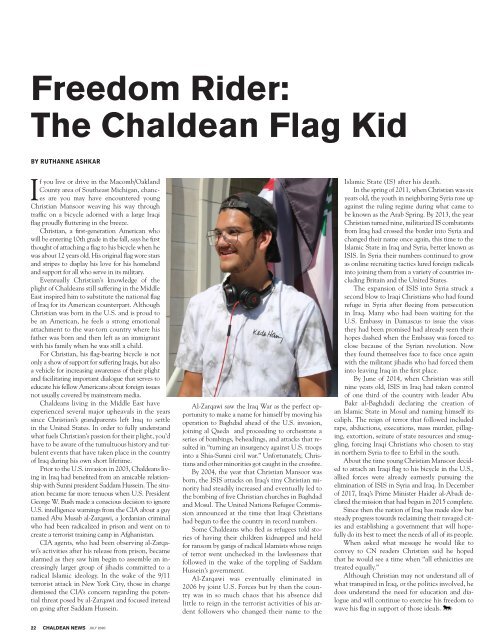Create successful ePaper yourself
Turn your PDF publications into a flip-book with our unique Google optimized e-Paper software.
Freedom Rider:<br />
The Chaldean Flag Kid<br />
BY RUTHANNE ASHKAR<br />
If you live or drive in the Macomb/Oakland<br />
County area of Southeast Michigan, chances<br />
are you may have encountered young<br />
Christian Mansoor weaving his way through<br />
traffic on a bicycle adorned with a large Iraqi<br />
flag proudly fluttering in the breeze.<br />
Christian, a first-generation American who<br />
will be entering 10th grade in the fall, says he first<br />
thought of attaching a flag to his bicycle when he<br />
was about 12 years old. His original flag wore stars<br />
and stripes to display his love for his homeland<br />
and support for all who serve in its military.<br />
Eventually Christian’s knowledge of the<br />
plight of Chaldeans still suffering in the Middle<br />
East inspired him to substitute the national flag<br />
of Iraq for its American counterpart. Although<br />
Christian was born in the U.S. and is proud to<br />
be an American, he feels a strong emotional<br />
attachment to the war-torn country where his<br />
father was born and then left as an immigrant<br />
with his family when he was still a child.<br />
For Christian, his flag-bearing bicycle is not<br />
only a show of support for suffering Iraqis, but also<br />
a vehicle for increasing awareness of their plight<br />
and facilitating important dialogue that serves to<br />
educate his fellow Americans about foreign issues<br />
not usually covered by mainstream media.<br />
Chaldeans living in the Middle East have<br />
experienced several major upheavals in the years<br />
since Christian’s grandparents left Iraq to settle<br />
in the United States. In order to fully understand<br />
what fuels Christian’s passion for their plight, you’d<br />
have to be aware of the tumultuous history and turbulent<br />
events that have taken place in the country<br />
of Iraq during his own short lifetime.<br />
Prior to the U.S. invasion in 2003, Chaldeans living<br />
in Iraq had benefited from an amicable relationship<br />
with Sunni president Saddam Hussein. The situation<br />
became far more tenuous when U.S. President<br />
George W. Bush made a conscious decision to ignore<br />
U.S. intelligence warnings from the CIA about a guy<br />
named Abu Musab al-Zarqawi, a Jordanian criminal<br />
who had been radicalized in prison and went on to<br />
create a terrorist training camp in Afghanistan.<br />
CIA agents, who had been observing al-Zarqawi’s<br />
activities after his release from prison, became<br />
alarmed as they saw him begin to assemble an increasingly<br />
larger group of jihadis committed to a<br />
radical Islamic ideology. In the wake of the 9/11<br />
terrorist attack in New York City, those in charge<br />
dismissed the CIA’s concern regarding the potential<br />
threat posed by al-Zarqawi and focused instead<br />
on going after Saddam Hussein.<br />
Al-Zarqawi saw the Iraq War as the perfect opportunity<br />
to make a name for himself by moving his<br />
operation to Baghdad ahead of the U.S. invasion,<br />
joining al Qaeda and proceeding to orchestrate a<br />
series of bombings, beheadings, and attacks that resulted<br />
in “turning an insurgency against U.S. troops<br />
into a Shia-Sunni civil war.” Unfortunately, Christians<br />
and other minorities got caught in the crossfire.<br />
By 2004, the year that Christian Mansoor was<br />
born, the ISIS attacks on Iraq’s tiny Christian minority<br />
had steadily increased and eventually led to<br />
the bombing of five Christian churches in Baghdad<br />
and Mosul. The United Nations Refugee Commission<br />
announced at the time that Iraqi Christians<br />
had begun to flee the country in record numbers.<br />
Some Chaldeans who fled as refugees told stories<br />
of having their children kidnapped and held<br />
for ransom by gangs of radical Islamists whose reign<br />
of terror went unchecked in the lawlessness that<br />
followed in the wake of the toppling of Saddam<br />
Hussein’s government.<br />
Al-Zarqawi was eventually eliminated in<br />
2006 by joint U.S. Forces but by then the country<br />
was in so much chaos that his absence did<br />
little to reign in the terrorist activities of his ardent<br />
followers who changed their name to the<br />
Islamic State (IS) after his death.<br />
In the spring of 2011, when Christian was six<br />
years old, the youth in neighboring Syria rose up<br />
against the ruling regime during what came to<br />
be known as the Arab Spring. By 2013, the year<br />
Christian turned nine, militarized IS combatants<br />
from Iraq had crossed the border into Syria and<br />
changed their name once again, this time to the<br />
Islamic State in Iraq and Syria, better known as<br />
ISIS. In Syria their numbers continued to grow<br />
as online recruiting tactics lured foreign radicals<br />
into joining them from a variety of countries including<br />
Britain and the United States.<br />
The expansion of ISIS into Syria struck a<br />
second blow to Iraqi Christians who had found<br />
refuge in Syria after fleeing from persecution<br />
in Iraq. Many who had been waiting for the<br />
U.S. Embassy in Damascus to issue the visas<br />
they had been promised had already seen their<br />
hopes dashed when the Embassy was forced to<br />
close because of the Syrian revolution. Now<br />
they found themselves face to face once again<br />
with the militant jihadis who had forced them<br />
into leaving Iraq in the first place.<br />
By June of 2014, when Christian was still<br />
nine years old, ISIS in Iraq had taken control<br />
of one third of the country with leader Abu<br />
Bakr al-Baghdadi declaring the creation of<br />
an Islamic State in Mosul and naming himself its<br />
caliph. The reign of terror that followed included<br />
rape, abductions, executions, mass murder, pillaging,<br />
extortion, seizure of state resources and smuggling,<br />
forcing Iraqi Christians who chosen to stay<br />
in northern Syria to flee to Erbil in the south.<br />
About the time young Christian Mansoor decided<br />
to attach an Iraqi flag to his bicycle in the U.S.,<br />
allied forces were already earnestly pursuing the<br />
elimination of ISIS in Syria and Iraq. In December<br />
of 2017, Iraq’s Prime Minister Haider al-Abadi declared<br />
the mission that had begun in 2015 complete.<br />
Since then the nation of Iraq has made slow but<br />
steady progress towards reclaiming their ravaged cities<br />
and establishing a government that will hopefully<br />
do its best to meet the needs of all of its people.<br />
When asked what message he would like to<br />
convey to CN readers Christian said he hoped<br />
that he would see a time when “all ethnicities are<br />
treated equally.”<br />
Although Christian may not understand all of<br />
what transpired in Iraq, or the politics involved, he<br />
does understand the need for education and dialogue<br />
and will continue to exercise his freedom to<br />
wave his flag in support of those ideals.<br />
22 CHALDEAN NEWS <strong>JULY</strong> <strong>2020</strong>

















